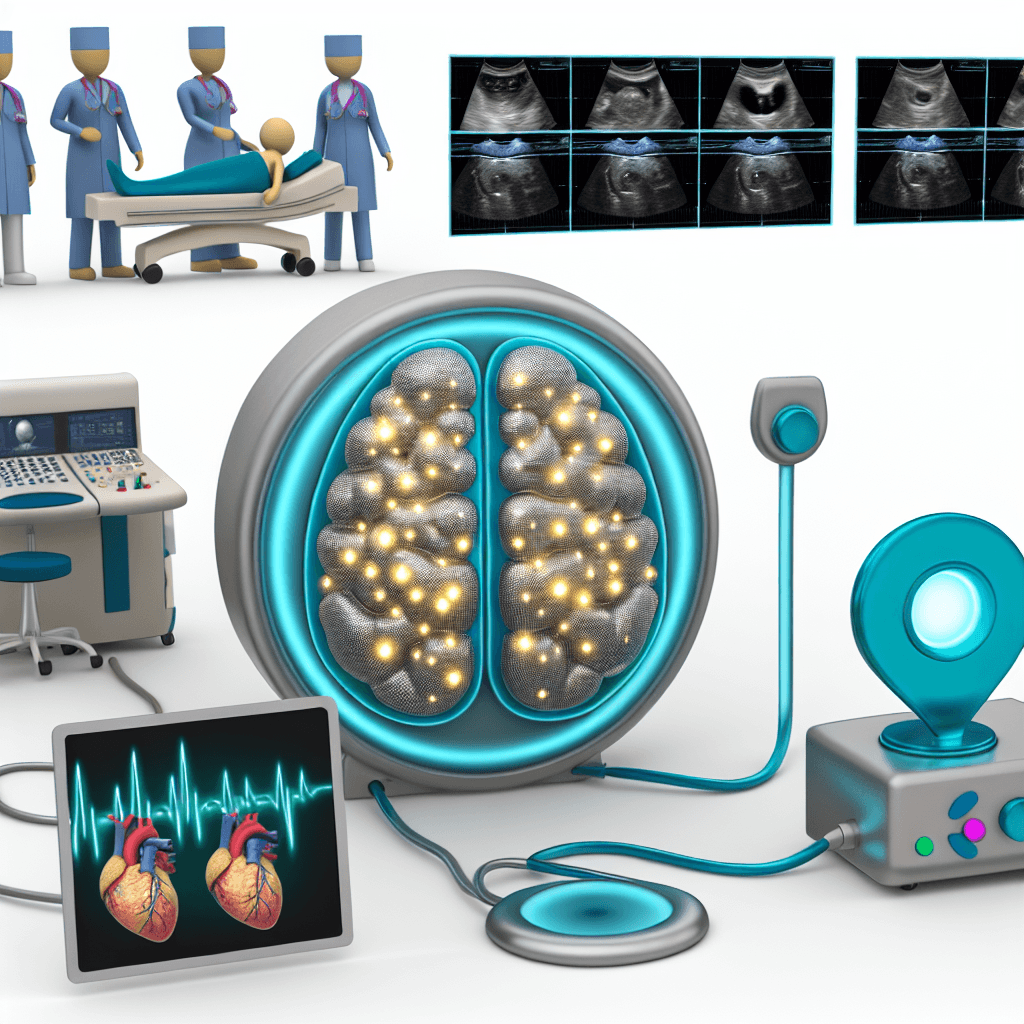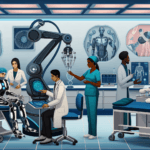Discover how AI technology is revolutionizing healthcare machinery, improving efficiency and accuracy for better patient outcomes. #AI #healthcare
How AI is Optimizing the Functionality of Healthcare Machinery

Table of Contents
“Revolutionizing healthcare with the power of AI – optimizing machinery for better patient outcomes.”
Introduction
Artificial intelligence (AI) has revolutionized the way we live and work, and the healthcare industry is no exception. With the advancements in technology, AI has become an integral part of healthcare machinery, optimizing its functionality and improving patient care. From diagnosis and treatment to administrative tasks, AI is transforming the healthcare sector, making it more efficient, accurate, and accessible. In this introduction, we will explore how AI is optimizing the functionality of healthcare machinery and its impact on the healthcare industry.
The Role of AI in Improving Medical Imaging Technology
Artificial intelligence (AI) has been making waves in various industries, and healthcare is no exception. With its ability to analyze vast amounts of data and make accurate predictions, AI has been revolutionizing the way medical professionals diagnose and treat patients. One area where AI has shown significant potential is in medical imaging technology. By optimizing the functionality of healthcare machinery, AI is helping medical professionals provide better and more efficient care to their patients.
Medical imaging technology plays a crucial role in the diagnosis and treatment of various medical conditions. It allows doctors to see inside the human body and identify any abnormalities or diseases. However, traditional medical imaging techniques have their limitations. They often require a significant amount of time and expertise to analyze the images, and there is always a risk of human error. This is where AI comes in.
AI-powered medical imaging technology has the potential to improve the accuracy and efficiency of medical diagnoses. By using algorithms and machine learning, AI can analyze medical images and provide insights that may not be visible to the human eye. This can help doctors make more accurate diagnoses and develop personalized treatment plans for their patients.
One of the most significant advantages of AI in medical imaging is its ability to detect and diagnose diseases at an early stage. For example, AI can analyze mammograms and identify signs of breast cancer that may be missed by human radiologists. This early detection can significantly improve the chances of successful treatment and save lives.
Moreover, AI can also help reduce the time and resources required for medical imaging procedures. With traditional methods, doctors have to manually analyze each image, which can be time-consuming. AI, on the other hand, can analyze images in a matter of seconds, allowing doctors to focus on other critical tasks. This not only saves time but also reduces the workload on medical professionals, allowing them to provide better care to their patients.
Another significant advantage of AI in medical imaging is its ability to learn and improve over time. As AI algorithms analyze more and more medical images, they become more accurate and efficient. This means that with time, AI can provide even more precise diagnoses and help doctors make better treatment decisions.
However, the use of AI in medical imaging technology is not without its challenges. One of the main concerns is the potential for bias in the algorithms. If the data used to train the AI is biased, it can lead to inaccurate diagnoses and treatment recommendations. To address this issue, it is crucial for developers to ensure that the data used to train AI algorithms is diverse and representative of the population.
Moreover, there are also concerns about the ethical implications of using AI in healthcare. For example, who is responsible if an AI algorithm makes a wrong diagnosis? These concerns need to be addressed and regulations put in place to ensure the responsible and ethical use of AI in medical imaging technology.
In conclusion, AI is playing a significant role in improving the functionality of healthcare machinery, particularly in medical imaging technology. By providing more accurate and efficient diagnoses, AI is helping doctors provide better care to their patients. However, it is essential to address the challenges and ethical implications of using AI in healthcare to ensure its responsible and effective use. With continued advancements in AI technology, the future of medical imaging looks promising, and it is exciting to see how it will continue to improve patient outcomes.
How AI is Enhancing the Accuracy of Diagnosis and Treatment Plans

Artificial intelligence (AI) has been making waves in various industries, and healthcare is no exception. With its ability to analyze vast amounts of data and make predictions, AI has been optimizing the functionality of healthcare machinery, leading to more accurate diagnosis and treatment plans. In this article, we will explore how AI is enhancing the accuracy of diagnosis and treatment plans in the healthcare industry.
One of the main ways AI is improving the accuracy of diagnosis is through medical imaging. Medical imaging, such as X-rays, MRIs, and CT scans, plays a crucial role in diagnosing various medical conditions. However, interpreting these images can be a time-consuming and error-prone process. This is where AI comes in. By using deep learning algorithms, AI can analyze medical images and identify abnormalities that may be missed by human eyes. This not only saves time but also improves the accuracy of diagnosis.
Moreover, AI can also assist in identifying patterns and trends in medical data that may not be apparent to human physicians. This is particularly useful in complex cases where multiple factors need to be considered. AI can analyze a patient’s medical history, lab results, and other data to identify potential risk factors and make more accurate predictions about their health. This can help physicians make more informed decisions about treatment plans and improve patient outcomes.
Another area where AI is enhancing the accuracy of diagnosis is in the field of pathology. Pathologists play a crucial role in diagnosing diseases by examining tissue samples under a microscope. However, this process can be time-consuming and prone to human error. AI-powered image analysis tools can assist pathologists in identifying abnormalities in tissue samples, reducing the chances of misdiagnosis. This not only saves time but also improves the accuracy of diagnosis, leading to better treatment plans for patients.
In addition to improving the accuracy of diagnosis, AI is also optimizing treatment plans for patients. One way AI is doing this is through precision medicine. Precision medicine involves tailoring treatment plans to individual patients based on their genetic makeup, lifestyle, and other factors. AI can analyze vast amounts of data and identify patterns that can help physicians determine the most effective treatment plan for a particular patient. This not only leads to better outcomes but also reduces the risk of adverse reactions to medications.
Moreover, AI can also assist in predicting the effectiveness of different treatment options for a particular patient. By analyzing data from previous cases, AI can help physicians determine which treatment plan is most likely to be successful for a patient based on their unique characteristics. This not only saves time but also reduces the risk of trial and error in treatment plans, leading to better outcomes for patients.
Furthermore, AI is also improving the accuracy of surgical procedures. With the help of AI-powered robots, surgeons can perform complex surgeries with more precision and accuracy. These robots can analyze real-time data and make adjustments to ensure the best possible outcome for the patient. This not only reduces the risk of human error but also allows for more complex and delicate procedures to be performed.
In conclusion, AI is revolutionizing the healthcare industry by enhancing the accuracy of diagnosis and treatment plans. From medical imaging to precision medicine and surgical procedures, AI is optimizing the functionality of healthcare machinery and improving patient outcomes. As technology continues to advance, we can expect to see even more significant improvements in the accuracy and effectiveness of healthcare with the help of AI.
The Impact of AI on Streamlining Hospital Operations and Workflow
Artificial intelligence (AI) has been making waves in various industries, and healthcare is no exception. With the advancements in technology, AI has been integrated into healthcare machinery to optimize functionality and streamline hospital operations and workflow. This has resulted in improved patient care, increased efficiency, and reduced costs.
One of the main areas where AI has made a significant impact is in medical imaging. Traditional medical imaging techniques, such as X-rays and MRIs, require a radiologist to manually analyze and interpret the images. This process can be time-consuming and prone to human error. However, with the use of AI, medical imaging has become more efficient and accurate.
AI-powered medical imaging systems use algorithms to analyze images and detect abnormalities or potential health issues. This not only speeds up the diagnosis process but also reduces the chances of misinterpretation. Additionally, AI can continuously learn and improve its accuracy, making it a valuable tool for healthcare professionals.
Another area where AI has been optimizing the functionality of healthcare machinery is in robotic surgery. Robotic surgery has been around for a while, but with the integration of AI, it has become even more precise and efficient. AI-powered robots can analyze data from pre-operative scans and assist surgeons in performing complex procedures with greater accuracy.
Moreover, AI can also help in real-time decision-making during surgery. By analyzing data from the patient’s vital signs and other factors, AI can alert the surgeon of any potential complications or suggest alternative approaches. This not only improves patient outcomes but also reduces the risk of human error.
Apart from medical imaging and surgery, AI has also been integrated into hospital equipment such as ventilators and infusion pumps. These machines are crucial in providing life support to patients, and any malfunction or error can have severe consequences. With AI, these machines can continuously monitor the patient’s condition and adjust their settings accordingly. This reduces the workload on healthcare professionals and ensures that patients receive the best possible care.
AI has also been used to optimize hospital operations and workflow. One of the most significant challenges in healthcare is managing patient flow. With AI, hospitals can predict patient demand and allocate resources accordingly. This not only reduces wait times but also ensures that patients receive timely and appropriate care.
Additionally, AI can also assist in inventory management. Hospitals have to manage a vast array of medical supplies, and keeping track of them can be a daunting task. With AI, hospitals can predict the demand for supplies and ensure that they are always adequately stocked. This not only saves time and effort but also reduces the chances of running out of essential supplies.
Moreover, AI can also help in scheduling appointments and managing patient records. By analyzing data from previous appointments and patient history, AI can suggest the best time slots for appointments and even predict potential no-shows. This not only improves the efficiency of the hospital but also enhances the patient experience.
In conclusion, AI has had a significant impact on optimizing the functionality of healthcare machinery and streamlining hospital operations and workflow. From medical imaging to surgery and even hospital management, AI has proven to be a valuable tool in improving patient care and reducing costs. As technology continues to advance, we can expect to see even more innovative uses of AI in the healthcare industry.
Future Possibilities: AI’s Potential in Revolutionizing Healthcare Machinery
Artificial intelligence (AI) has been making waves in various industries, and healthcare is no exception. With its ability to analyze vast amounts of data and make decisions based on that data, AI has the potential to revolutionize the functionality of healthcare machinery. From diagnosis to treatment, AI is paving the way for more efficient and accurate healthcare processes.
One of the most significant ways AI is optimizing the functionality of healthcare machinery is through its ability to assist in diagnosis. With the help of machine learning algorithms, AI can analyze medical images and identify patterns that may be missed by human eyes. This can lead to earlier and more accurate diagnoses, which can ultimately save lives.
In addition to diagnosis, AI is also being used to improve the functionality of medical devices. For example, AI-powered sensors can be attached to medical equipment to monitor their performance and detect any potential malfunctions. This can help prevent equipment failures and ensure that patients receive the best possible care.
Furthermore, AI is also being utilized in the development of new medical devices. By analyzing data from previous medical devices and patient outcomes, AI can help researchers and engineers create more effective and efficient devices. This can lead to the development of groundbreaking technologies that can improve patient outcomes and revolutionize the healthcare industry.
Another area where AI is making a significant impact is in surgery. With the help of AI-powered robots, surgeons can perform complex procedures with more precision and accuracy. These robots can also be used to assist in surgeries, reducing the risk of human error and improving patient safety. Additionally, AI can analyze data from previous surgeries to help surgeons make more informed decisions during procedures.
AI is also being used to optimize the functionality of healthcare machinery in hospitals and clinics. With the help of AI-powered systems, healthcare facilities can better manage their resources and improve patient care. For example, AI can analyze patient data and predict which patients are at risk of developing complications, allowing healthcare providers to intervene early and prevent adverse outcomes.
Moreover, AI is also being used to improve the functionality of medical devices for patients at home. With the rise of telemedicine, AI-powered devices can monitor patients’ vital signs and alert healthcare providers if there are any concerning changes. This can help patients manage chronic conditions and reduce the need for frequent hospital visits.
In addition to improving the functionality of existing healthcare machinery, AI also has the potential to create entirely new devices. For example, researchers are exploring the use of AI-powered nanobots that can deliver medication directly to targeted areas in the body. This could revolutionize drug delivery and make treatments more effective and efficient.
Furthermore, AI is also being used to improve the functionality of prosthetics. With the help of AI, prosthetics can be designed to mimic the movements of natural limbs, providing a more natural and intuitive experience for amputees. This can greatly improve their quality of life and allow them to perform daily tasks with greater ease.
In conclusion, AI has immense potential in revolutionizing the functionality of healthcare machinery. From diagnosis to treatment, AI is making a significant impact in improving patient outcomes and streamlining healthcare processes. As technology continues to advance, we can expect to see even more groundbreaking developments in the field of AI and healthcare machinery. The future possibilities are endless, and the potential for AI to transform the healthcare industry is truly exciting.
Q&A
1. How is AI being used to optimize the functionality of healthcare machinery?
AI is being used in various ways to optimize the functionality of healthcare machinery. One way is through predictive maintenance, where AI algorithms can analyze data from medical equipment to predict when maintenance is needed, reducing downtime and improving efficiency. AI is also being used to improve the accuracy and speed of medical imaging, such as MRI and CT scans, by automating the process of image analysis. Additionally, AI is being used to assist with surgical procedures, such as robotic surgery, to improve precision and reduce the risk of human error.
2. What are the benefits of using AI in healthcare machinery?
There are several benefits of using AI in healthcare machinery. One major benefit is improved efficiency and accuracy. AI algorithms can analyze data and make decisions much faster and more accurately than humans, leading to better diagnoses and treatment plans. Additionally, AI can help reduce human error and improve patient outcomes. It can also help with cost reduction by optimizing equipment maintenance and reducing the need for manual labor.
3. Are there any concerns about using AI in healthcare machinery?
While there are many potential benefits of using AI in healthcare machinery, there are also some concerns. One concern is the potential for AI to make mistakes or misinterpret data, which could lead to incorrect diagnoses or treatment plans. There are also concerns about the ethical implications of relying too heavily on AI in healthcare, such as the potential for bias in algorithms or the loss of human connection in patient care.
4. How can healthcare professionals ensure the responsible use of AI in healthcare machinery?
To ensure the responsible use of AI in healthcare machinery, healthcare professionals should prioritize transparency and accountability. This includes thoroughly testing and validating AI algorithms before implementing them, as well as regularly monitoring and auditing their performance. It is also important for healthcare professionals to continue to prioritize human oversight and decision-making in patient care, rather than relying solely on AI. Additionally, ethical guidelines and regulations should be established and followed to address any potential issues with bias or privacy.
Conclusion
In conclusion, AI technology has greatly optimized the functionality of healthcare machinery. With its ability to analyze vast amounts of data and make accurate predictions, AI has improved the accuracy and efficiency of medical diagnoses and treatments. It has also enabled the development of advanced medical imaging and robotic surgical systems, making procedures safer and more precise. Additionally, AI has enhanced patient care by providing personalized treatment plans and improving communication between healthcare professionals. As AI continues to advance, it has the potential to revolutionize the healthcare industry and improve the overall quality of patient care.








